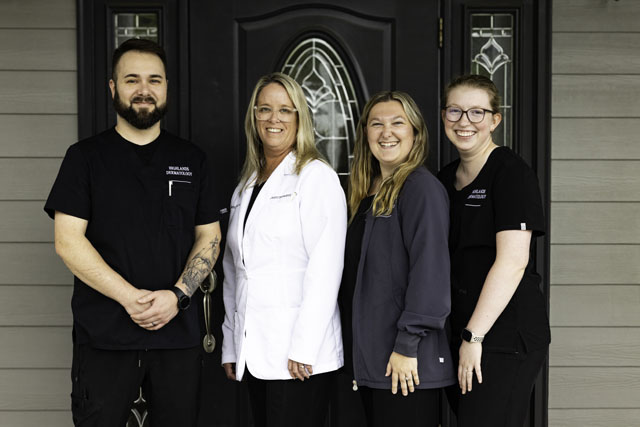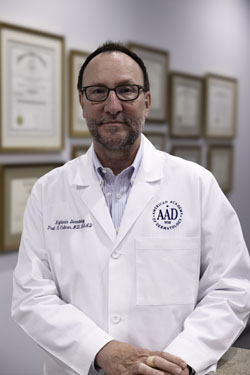Skin Deep
04 Jun 2024
Highlands Dermatology
By Liesel Schmidt
Photos by Carole Shepardson

With the recent exponential increase in the occurrence of skin cancers, dermatology has become a critical component of health care in the United States. By 2040, melanoma is predicted to be the No. 1 invasive cancer in males and No. 2 in females, second only to breast cancer.
The key to changing those statistics naturally comes down to awareness and prevention, though it is the treatment of these cancers that will prove to be the greatest factor in affecting the outcomes of these numbers. This is where the practice of dermatology becomes the most crucial, offering screenings in hopes of preventing the development of cancer, early detection to mitigate the risk of metastasis and treatment options when cancer is detected.
Operating offices in Highlands, Franklin and Brevard, Highlands Dermatology offers dermatologic care to diagnose and treat all skin cancers, including melanoma. Highlands Dermatology recently celebrated its 20th anniversary of providing dermatologic care in western North Carolina. “It has been a great pleasure living in western North Carolina and providing skin care to patients in Highlands and the surrounding communities,” says Dr. Paul Cabiran, founder of Highlands Dermatology. “We are very thankful to all the patients and referring physicians in the area that have put their trust in our practice for the last 20 years.”
Originally from Louisiana, Dr. Cabiran received his medical degree from Louisiana State University (LSU) Medical School in New Orleans. He performed his internship and residency in internal medicine at Alton Ochsner Medical Foundation Hospital and later entered the residency program in dermatology at LSU Medical Center, completing his dermatology residency at Charity Hospital in the LSU dermatology residency program. Upon completion, Dr. Cabiran practiced at Ochsner Clinic Foundation in Baton Rouge, LA, where he provided general dermatology and dermatologic surgery services. He went on to establish Highlands Dermatology in 2004.

“My interest in dermatology began in my second year of medical school,” says Cabiran of what led to his change of course in specialty. “It is a field of medicine that is visually evident. The skin is the largest single organ of the human body, and dermatology encompasses many areas of medicine, including surgery, immunology and pathology.”
Skin is, by and large, a barometer for so many areas of health, visually presenting a number of underlying issues that we might not otherwise be aware of, from lack of vitamins and malnutrition to inflammatory issues. “Dermatology is a multi-faceted specialty, and I’m proud of the medical care that our team has provided to our patients over the last 20 years,” says Dr. Cabiran.
After opening its first location in March of 2004 at Highlands-Cashiers Hospital, the practice eventually opened two other locations to meet the needs of patients within the communities of Franklin and Brevard. Highlands Dermatology also provides care to patients in north Georgia and other counties in western North Carolina. The growth of the practice also brought the addition of three mid-level providers to the team, including two nurse practitioners, Jane Pressler, FNP, DCNP, and Lindsey Koach, DNP, APRN, FNP-C, as well as a physician assistant, Chris Trotter, MSPAS, PA-C—all of whom bring a high degree of patient care, expertise and professionalism to the practice and its range of services and treatments. Naturally, this includes cancer screenings for skin cancers and also comprises the treatment of acne, eczema, psoriasis, rosacea, moles, warts, wrinkles and hyperpigmentation, as well as such cosmetic services as Botox and dermal fillers.
In the last 20 years, Dr. Cabiran has seen vast improvements in medicine—not only in technology but also in treatment options. “It’s been incredibly beneficial to providers to have the technological advances in medicine recently, including electronic medical records, digital photography and dermoscopy of potentially malignant pigmented skin lesions,” says Dr. Cabiran. “All of this has greatly improved our accuracy and efficiency in the diagnosis and treatment of all skin ailments. In the early days of the practice, the occurrence of melanoma was less common but is now more prevalent, so I’m hopeful that these technological advancements will help combat that rise.”
As Highlands Dermatology looks to the future they will continue to utilize the latest advancements in pharmaceuticals and technology in the diagnosis and treatment of all skin ailments.
For more information, visit highlandsdermatology.com.













